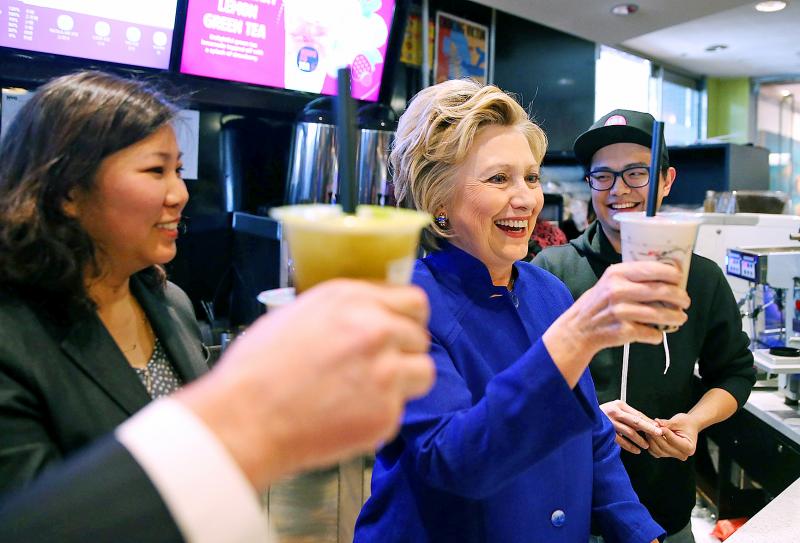The US for the first time became Taiwan’s largest market for exports of agricultural products, with outbound shipments in the first quarter surging 33.3 percent to US$23.2 million from a year earlier, the Council of Agriculture (COA) said yesterday.
The council’s latest report showed that the top five importers of Taiwanese agricultural produce, totaling 450,000 tonnes, in the first three months of this year were, in descending order, the US, Japan, China, Hong Kong and Vietnam.
China was the largest importer of Taiwanese produce from 2013 to last year. However, its share of Taiwanese agricultural exports fell to 14.4 percent in the first quarter of this year from 21.1 percent a year earlier.

Photo: AFP
While first-quarter exports of agricultural produce in volume terms dropped 11.6 percent from a year earlier, total export value, adjusted for inflation, was similar to the same period last year, the council said.
First-quarter exports to the US jumped 48.7 percent to 75,742 tonnes from a year earlier, council data showed.
In particular, exports to the US of soybeans, mushrooms, fresh and refrigerated produce, honey, Oncidium flexuosum orchids, moth orchids, sea bass and mackerel all posted significant growth, the council said.
Outbound shipments of agricultural products used in the hand-shaken beverage industry, such as tea leaves, tapioca flour, and pineapple and mango juices also saw sharp growth, it said.
Exports of pineapple juice jumped 440.5 percent to 72 tonnes, while exports of mango juice surged 191.6 percent to 280 tonnes, it added.
Meanwhile, exports to Japan rose 16.6 percent to US$2.07 million in the first three months of this year, council data showed.
The council expects agricultural exports in the first half of the year to follow the trend in the first quarter, COA International Division Director Lin Chia-jung (林家榮) said, as the COVID-19 pandemic continues to affect logistics and transportation.
An upcoming trade initiative meeting with the US should further flesh out bilateral trade regulations, such as establishing a science and risk-based standard, and benefit bilateral agricultural trade, he added.
Lin was referring to the talks on the Taiwan-US Initiative on 21st Century Trade, set to be held in Washington at the end of this month.

INVESTIGATION: The case is the latest instance of a DPP figure being implicated in an espionage network accused of allegedly leaking information to Chinese intelligence Democratic Progressive Party (DPP) member Ho Jen-chieh (何仁傑) was detained and held incommunicado yesterday on suspicion of spying for China during his tenure as assistant to then-minister of foreign affairs Joseph Wu (吳釗燮). The Taipei District Prosecutors’ Office said Ho was implicated during its investigation into alleged spying activities by former Presidential Office consultant Wu Shang-yu (吳尚雨). Prosecutors said there is reason to believe Ho breached the National Security Act (國家安全法) by leaking classified Ministry of Foreign Affairs information to Chinese intelligence. Following interrogation, prosecutors petitioned the Taipei District Court to detain Ho, citing concerns over potential collusion or tampering of evidence. The

‘FORM OF PROTEST’: The German Institute Taipei said it was ‘shocked’ to see Nazi symbolism used in connection with political aims as it condemned the incident Sung Chien-liang (宋建樑), who led efforts to recall Democratic Progressive Party (DPP) Legislator Lee Kun-cheng (李坤城), was released on bail of NT$80,000 yesterday amid an outcry over a Nazi armband he wore to questioning the night before. Sung arrived at the New Taipei City District Prosecutors’ Office for questioning in a recall petition forgery case on Tuesday night wearing a red armband bearing a swastika, carrying a copy of Adolf Hitler’s Mein Kampf and giving a Nazi salute. Sung left the building at 1:15am without the armband and apparently covering the book with a coat. This is a serious international scandal and Chinese

Seventy percent of middle and elementary schools now conduct English classes entirely in English, the Ministry of Education said, as it encourages schools nationwide to adopt this practice Minister of Education (MOE) Cheng Ying-yao (鄭英耀) is scheduled to present a report on the government’s bilingual education policy to the Legislative Yuan’s Education and Culture Committee today. The report would outline strategies aimed at expanding access to education, reducing regional disparities and improving talent cultivation. Implementation of bilingual education policies has varied across local governments, occasionally drawing public criticism. For example, some schools have required teachers of non-English subjects to pass English proficiency

TRADE: The premier pledged safeguards on ‘Made in Taiwan’ labeling, anti-dumping measures and stricter export controls to strengthen its position in trade talks Products labeled “made in Taiwan” must be genuinely made in Taiwan, Premier Cho Jung-tai (卓榮泰) said yesterday, vowing to enforce strict safeguards against “origin laundering” and initiate anti-dumping investigations to prevent China dumping its products in Taiwan. Cho made the remarks in a discussion session with representatives from industries in Kaohsiung. In response to the US government’s recent announcement of “reciprocal” tariffs on its trading partners, President William Lai (賴清德) and Cho last week began a series of consultations with industry leaders nationwide to gather feedback and address concerns. Taiwanese and US officials held a videoconference on Friday evening to discuss the